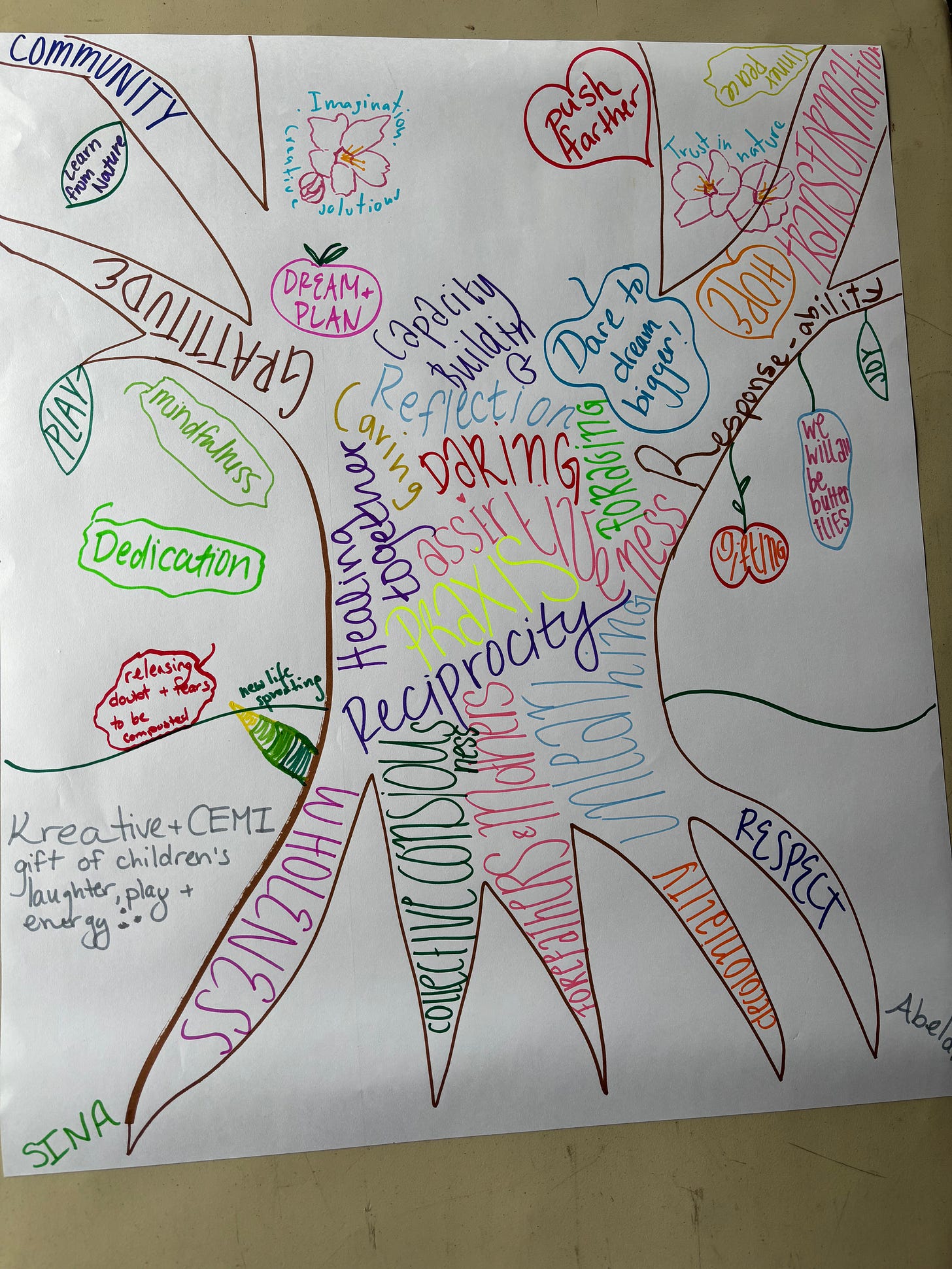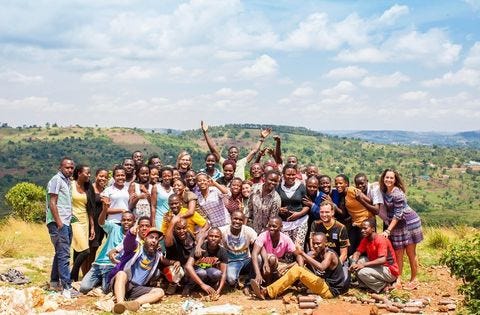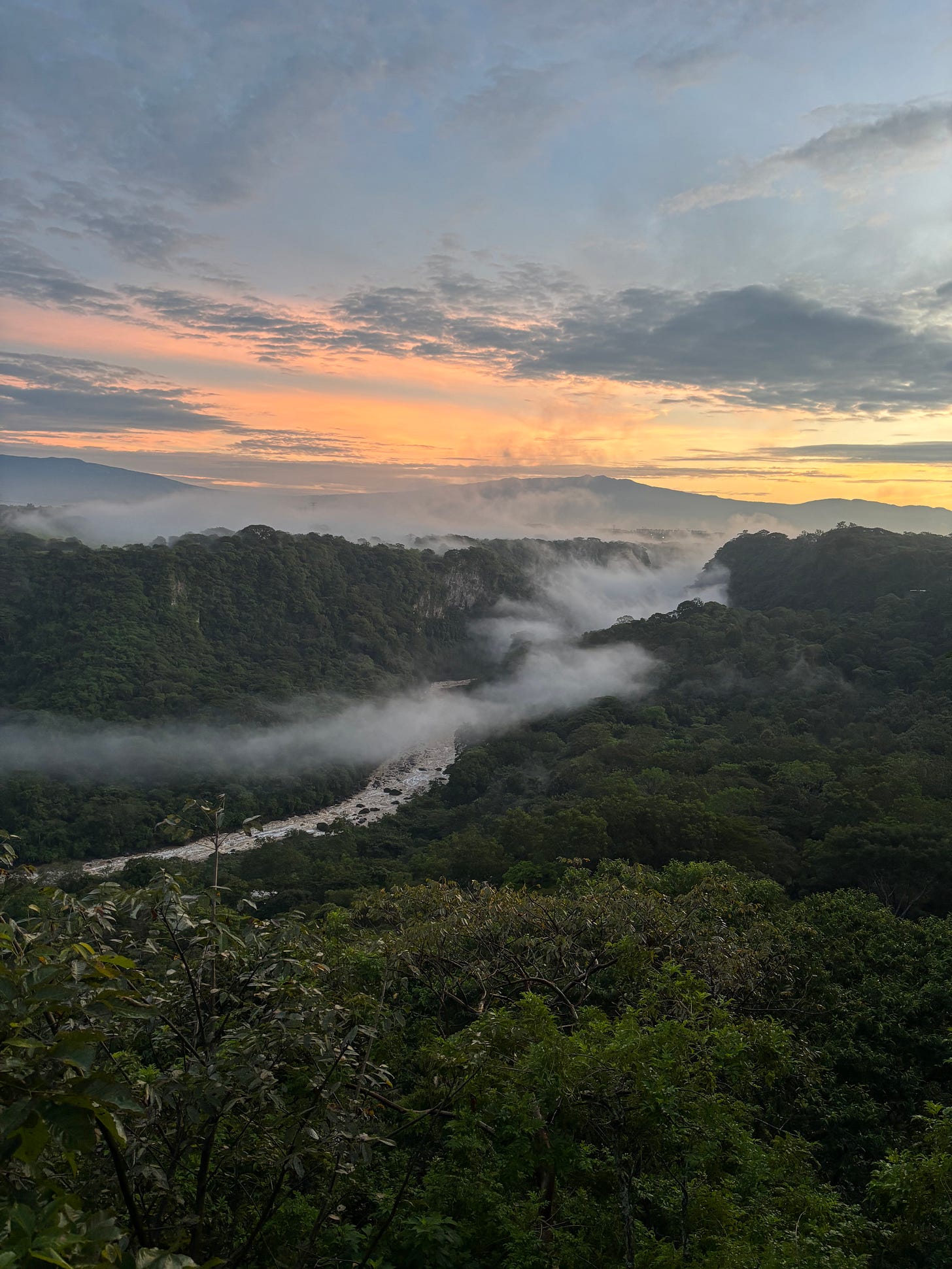Dear Enchantable readers,
Beyond the ruins of present dysfunctional systems, what becomes possible?
Today I am not going to give you a post-(US)-election commentary. I imagine you are receiving enough of those right now. And I am not here to bypass the pain of this moment, which I feel along with you.
Something that has been buoying me this week is focusing on folks working to create alternatives beyond existing systems. Today I want to share about two organizations whose work in educational realms has been very meaningful to me and present with me this week: Social Innovation Academy (SINA) and Pachaysana. Both SINA and Pachaysana are living examples and demonstrate through their work how other worlds are possible within this world, even amidst the most challenging circumstances. Both organizations were created from the failure and dysfunction of dominant systems to meet people’s needs, and both have tried to respond differently to those needs by creating alternatives beyond them. This feels like vitally important wisdom for this moment. I hope that hearing about their initiatives might give you some hope-in-action amidst the devastation of this week’s election.
Social Innovation Academy (SINA)
You may remember SINA from last year’s post reflecting on the 2023 DRC Social Innovation Summit, where I had the chance to meet SINA’s founder, Etienne Salborn (UPEACE Peace Education class of 2012). You can watch Etienne share the story of SINA’s founding and all about the organization in the recording below of the guest talk he gave to our peace education class last week. I invite you to watch the whole conversation, and here I will share some highlights and some key ideas and reflections I walked away from the conversation with.
SINA is a living example of peace education in action, and was born from the failure of the national educational system in Uganda. Many youth are not able to complete their education beyond elementary school, and even when they do, they are not able to find employment. SINA arose from this need to create livelihoods through social enterprises that addressed community challenges that present systems were not addressing.
SINA participants are called scholars. When scholars first arrived, SINA found that in order to begin to create social enterprises, scholars had to overcome many limiting beliefs that they had internalized through their formal schooling and dominant culture. Before arriving to the program, obedience was the core trait drilled into them in formal schooling systems. Through much unlearning in community at SINA, scholars learn “freesponsibility” – as the word implies, learning how to be free and responsible at the same time. The first three months when they arrive to SINA are spent unlearning limiting beliefs and learning how to live in community through developing skills such as nonviolent communication, conflict resolution, and a holocratic model of organizational governance.
“What is the point of education if it does not prepare you for life?”
Etienne asked this question as he talked about how the education system in Uganda was not preparing students for life, and I feel like this is true of many education systems around the world. While SINA has resulted in dozens of businesses and hundreds of jobs being created, not all students go on to start a social enterprise, but they have found that the skills students learn at SINA through the process, including communication, conflict transformation, and leadership skills, make SINA graduates highly employable in existing organizations. SINA provides a space to learn to live well.
Etienne also talked about how their long-term goal is to change the educational system, “not by telling them what’s right or wrong, but by showing another way.” Critique is necessary, as is fighting current systems, but creating alternatives is equally necessary, and SINA’s example speaks for itself in terms of its success and how it is preparing scholars to live meaningful and impactful lives. SINA fights the old system by showing another way that makes the old way obsolete.
SINA serves the most vulnerable populations – youth who were exiled from the education system, or who were not able to succeed within it. In the wake of the US elections and Trump’s declaration that he will abolish the Department of Education, I am thinking about this. Dismantling the Department of Education, if he is able to do this, would have devastating consequences for children in the US, especially the most vulnerable. But it also has me wondering, if this happens, in the ruins, how might we create alternatives that not only reach the most vulnerable students, but allow them to thrive? How, in and beyond the ruins, might we create more equity, more justice, more life-affirming pathways?
Etienne used many nature-based metaphors in describing SINA, and SINA’s model feels very grounded in regenerative peace pedagogies. SINA’s approach seeks to get to the roots of problems. For example, one initiative that upcycles plastic bottles into building material sees waste as a resource, but also has a mission to reduce plastic waste and began creating plant-based straws to this effect. Etienne also talked about how SINA, in its expansion from one campus into many, is “replicating the way nature replicates.” The seed of the SINA framework holds its DNA - the years of knowledge created through experience and iterative trial-and-error - but each SINA community looks different according to where it is planted and local conditions and needs.
When I asked Etienne how UPEACE had influenced his trajectory in founding SINA, he said two words that really moved me: “spark” and “connections.” He said the spark of the idea came to him there, and that it was through the connections with other classmates at UPEACE that the idea was able to come into fruition. To me this is an important example of how the relationships we cultivate through a learning community are as much if not more important than the content we are learning. They are the heart of it!
Here is a recent post from UPEACE featuring Etienne in the Alumni Spotlight :
Pachaysana: Unlearning Retreats
Another organization whose work I want to share today is Ecuador-based Pachaysana. I had the honor and pleasure of learning about their work through my dissertation research (you can find the whole dissertation in the preceding link, and I also created a 10-page Pachaysana excerpt you can find here). Pachaysana evolved from the dysfunction and harm of global study abroad programs that would bring students from the Global North to the Global South to “study” in very extractive ways, leaving very little benefit to local communities and replicating colonial harm and dominant narratives. Pachaysana “re-imagines the dominant models of education and land use in our world. We create just alternatives through innovative educational and environmental programming.”
Pachaysana has a new offering called Unlearning Retreats, which they describe in the following way:
Our Unlearning Retreats are crafted in partnership with local Indigenous communities, creating spaces where we all unlearn and grow together. These retreats will help participants develop the knowledge and skills necessary to transform their work as educators, activists, and community-builders.
Our focus extends beyond merely unlearning dominant narratives; we will also engage in reimagining new stories and integrating diverse ways of knowing and being into our work and personal growth.
Throughout the retreat, our daily practices will emphasize radical listening, radical empathy, and radical imagination. By the end of the experience, each participant will feel inspired and equipped to apply their newfound insights to transform their institutions, redesign their teaching, and repurpose their activism.
I can’t recommend their work enough. I hope to attend an unlearning retreat in the future, and I encourage you to look into it if this speaks to you. I don’t know if it will be in the cards for me in 2025, but I do plan to put it on my vision board 😊
Speaking of vision boards, it is almost December, which means it’s time to make December magic. I invite you to join me in this potent period of end-of-year reflecting and spellcasting for other worlds to be possible, as we need spells for collective liberation more than ever. Pluto moves into Aquarius in nine days, and the cosmic energy is supportive of people power and revolution – but it will be up to us to see what direction that power flows in. As my friend Yumi Sakugawa asked the other day, “Who will you be broken into in this era?”

Friday I finished teaching my three-week intensive on peace education theory and practice. I am reflecting on the fullness of the past 3 weeks: moving houses, public engagements, and teaching, among other things. I am exhausted, but I am also dwelling in the gift that I know so many beings who are trying, through their lives and work, to make other worlds possible within this one - like this Land Back initiative that my friend AD is working on. Amidst the pain of this moment, I hold onto all of this like a life raft, carrying me down this bumpy stretch of river.
On that note, I will close with a favorite poem, Boddhisatva Vows by Albert Saijo:
I love you. Take care out there, and hold each other close. Protect each other - especially those who are made less safe by the results of this election. We need each other.
May we be protected. May we find ways to stay cheerful even now. May we buoy each other.
With love and care,
Stephanie







